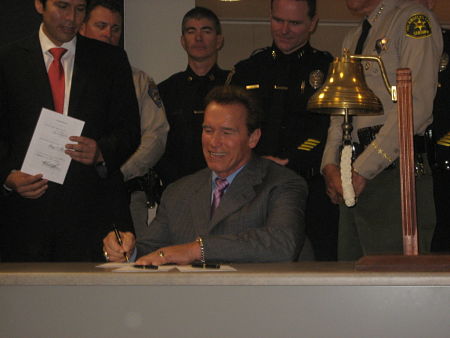Gov. Schwarzenegger Signs New Ammo Regulation Law

AB 962 will require ammunition retailers to keep track of customers through
fingerprints and driver's license records. (photo by Christine Trang)
In August 1999, white supremacist Buford Furrow, Jr. walked into the North Valley Jewish Center in Granada Hills and opened fire. Mindy Finkelstein, then 16, worked at the center as a camp counselor and just finished a game of capture the flag with a group of 5-year-olds. She walked into the lobby when two bullets from Furrow's semiautomatic weapon struck her leg. The gunfire also wounded three children and an office worker. Hoping to use this situation to make a difference, Finkelstein now works with Women Against Gun Violence and the Brady Campaign To Prevent Gun Violence.
"I suffered a lot emotionally and physically, but I now try to look at everything in a positive light," Finkelstein said. "I look at the event as if it were another way for me to help change legislation, and today's outcome is an example of that."
Despite much opposition from pro-gun groups such as the National Shooting Sports Foundation and the California Association of Firearms Retailers, Gov. Arnold Schwarzenegger signed AB 962, authored by Assemblymember Kevin de Leon, D-Los Angeles. This is the first time a bill will regulate ammunition sales throughout the state. The governor signed the bill on Thursday at the Los Angeles Police Department dispatch center.
"As you may recall, I vetoed similar bills in the past," Schwarzenegger said. "I did not feel that we had enough evidence to pass the bill at the time, but now we do. This is the appropriate balance between gun owners and the public."
Starting February 2011, retailers in California must store ammunition safely behind counters. They must also create a record of people who purchase ammunition through fingerprints and driver's license records and make this registry available to law enforcement. Ammunition sales will be face-to-face, eliminating the option of internet purchases.
Sacramento is one city, among 13 others across California, which successfully enacted ammunition record-keeping laws. Almost 200 criminals, who were not legally entitled to buy ammunition, were caught and reprimanded, Schwarzenegger said.
"You won't imagine what we found in their apartments," the governor said. "Only because of that law, we discovered that these people had illegal drugs, illegal guns and much more illegal ammunition. Imagine how many lives that saved."
Groups opposing the bill argue that having this kind of law "has been proven ineffective."
"It is silly, at best, to think criminals will stand in line to be
fingerprinted to buy ammunition from licensed retailers. Governor
Schwarzenegger has just created an underground black market for
ammunition," California Association of Firearms Retailers President Marc Halcon said in a press release.
Assemblyman De Leon described this law as a "common sense law," but a concerned member of the audience brought up another issue. Any lead to a case that this bill offers is still "after the fact" of someone's injury or death, the member of the audience said.
De Leon did not completely disagree, but said, "This bill will still set up a platform for law enforcement and will be a valuable tool."
Some board members from Women Against Gun Violence, an organization dedicated to the prevention of gun violence, also attended the news conference to express their full support for AB 962.
Rhonda Foster, a two-year board member, described the day she lost Evan, her 7-year-old son, to gun violence.
She drove to the park with Evan and Alec, her then 10-month-old son, to pick up Evan's soccer trophy. Foster backed her vehicle out of the parking spot and noticed that three men stood in front of her car. Within minutes, those men shot 75 rounds into a red car parked next to Foster's; 14 of those rounds hit Foster's vehicle. Two bullets struck Evan, who died at the scene, and a few more bullets struck Alec, who later received a cornea transplant for loss of vision. She hopes that this bill will act as a deterrent for criminals.
"If a criminal realizes that he might not be able to purchase ammunition, he might not go through with the crime," Foster said.
Sherri Barnett, president of Women Against Gun Violence, also lost her 25-year-old son to gun violence.
"We are not gun grabbers, we just want sensible laws," Barnett said.
Officers Abraham Yap and Roy Wade of the Long Beach Police Department had their own story to tell about what this bill means to them.
In December 2006, they patrolled an area in Long Beach together. During their patrol, a man fired at Yap and Wade 12 times in six seconds, something Yap said requires a lot of practice and a lot of access to ammunition. With the new bill active in less than two years, these criminals will not have as much access to ammunition.
"If criminals do obtain ammunition somehow, any lead will help," Yap said. "This bill helps give us that lead."
De Leon ended his talk by listing names and ages of constituents in his area who also died from acts of gun violence.
"I dedicate this bill to all of those innocent adults and children," De Leon said. "I also dedicate this bill to the children growing up in shadows of gang violence."
Members of the Brady Campaign to Prevent Gun Violence rang a bell at the end of the news conference. They usually ring the bell when they hear stories about someone in their community dying from gun violence, but this time, they rang it in victory.



